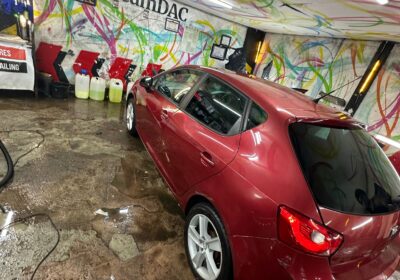When considering fuel efficiency, you’ll want to look at the car’s engine size and fuel type. Generally speaking, a smaller engine size and an electric or hybrid engine will provide more fuel efficiency. Additionally, you should also consider the car’s aerodynamics, which can affect the amount of drag on the car and therefore the fuel efficiency. The vehicle’s weight can also have an effect on fuel efficiency, as heavier cars require more energy to move. All of these factors should be taken into account when evaluating a car’s fuel efficiency.
[{"id":9812,"link":"https:\/\/www.locozuna.com\/discovering-tonies-the-screen-free-audio-entertainment-system-for-kids\/","name":"discovering-tonies-the-screen-free-audio-entertainment-system-for-kids","thumbnail":{"url":"https:\/\/www.locozuna.com\/wp-content\/uploads\/2023\/08\/image-17.png","alt":""},"title":"Discovering Tonies - The Screen-Free Audio Entertainment System for Kids","author":{"name":"admin","link":"https:\/\/www.locozuna.com\/author\/admin\/"},"date":"Aug 22, 2023","dateGMT":"2023-08-22 16:36:52","modifiedDate":"2023-08-22 16:37:24","modifiedDateGMT":"2023-08-22 16:37:24","commentCount":"0","commentStatus":"closed","categories":{"coma":"<a href=\"https:\/\/www.locozuna.com\/category\/family-entertainment\/\" rel=\"category tag\">Family Entertainment<\/a>","space":"<a href=\"https:\/\/www.locozuna.com\/category\/family-entertainment\/\" rel=\"category tag\">Family Entertainment<\/a>"},"taxonomies":{"post_tag":"<a href='https:\/\/www.locozuna.com\/tag\/kids-entertainment\/' rel='post_tag'>kids entertainment<\/a><a href='https:\/\/www.locozuna.com\/tag\/screenfree-audio\/' rel='post_tag'>screenfree audio<\/a><a href='https:\/\/www.locozuna.com\/tag\/toniebox\/' rel='post_tag'>toniebox<\/a><a href='https:\/\/www.locozuna.com\/tag\/tonies\/' rel='post_tag'>tonies<\/a>"},"readTime":{"min":1,"sec":51},"status":"publish","excerpt":"Tonies are a screen-free audio entertainment system that brings stories and music to life for kids through imaginative Toy Tonies and a Toniebox player. The hand-painted Tonies characters spark creativity and imagination as kids listen to crisp, clear audio. In this post, learn about our experience with Tonies and why they are a great screen-free option."},{"id":9770,"link":"https:\/\/www.locozuna.com\/the-guide-to-online-jobs-dive-into-the-digital-work-revolution\/","name":"the-guide-to-online-jobs-dive-into-the-digital-work-revolution","thumbnail":{"url":"https:\/\/www.locozuna.com\/wp-content\/uploads\/2023\/08\/image-14.png","alt":"online jobs"},"title":"The Guide to Online Jobs: Dive into the Digital Work Revolution","author":{"name":"admin","link":"https:\/\/www.locozuna.com\/author\/admin\/"},"date":"Aug 17, 2023","dateGMT":"2023-08-17 23:10:46","modifiedDate":"2023-08-17 23:30:04","modifiedDateGMT":"2023-08-17 23:30:04","commentCount":"0","commentStatus":"closed","categories":{"coma":"<a href=\"https:\/\/www.locozuna.com\/category\/online-jobs-website\/\" rel=\"category tag\">Jobs<\/a>","space":"<a href=\"https:\/\/www.locozuna.com\/category\/online-jobs-website\/\" rel=\"category tag\">Jobs<\/a>"},"taxonomies":{"post_tag":"<a href='https:\/\/www.locozuna.com\/tag\/digital-era\/' rel='post_tag'>Digital Era<\/a><a href='https:\/\/www.locozuna.com\/tag\/digital-marketing\/' rel='post_tag'>Digital Marketing<\/a><a href='https:\/\/www.locozuna.com\/tag\/digital-trends\/' rel='post_tag'>Digital Trends<\/a><a href='https:\/\/www.locozuna.com\/tag\/e-learning\/' rel='post_tag'>E-Learning<\/a><a href='https:\/\/www.locozuna.com\/tag\/flexibility\/' rel='post_tag'>Flexibility<\/a><a href='https:\/\/www.locozuna.com\/tag\/freelancing\/' rel='post_tag'>Freelancing<\/a><a href='https:\/\/www.locozuna.com\/tag\/networking\/' rel='post_tag'>Networking<\/a><a href='https:\/\/www.locozuna.com\/tag\/online-jobs\/' rel='post_tag'>Online Jobs<\/a><a href='https:\/\/www.locozuna.com\/tag\/work-from-home\/' rel='post_tag'>Work from Home<\/a>"},"readTime":{"min":2,"sec":48},"status":"publish","excerpt":"In the age of the internet, the traditional 9-5 office routine is being replaced by the allure of online jobs. Our guide delves deep into the world of remote work, offering insights into its benefits, popular job avenues, and tips for success. Join us as we navigate the digital work revolution and unveil the endless possibilities that await in the realm of online jobs."},{"id":9760,"link":"https:\/\/www.locozuna.com\/10-essential-tips-for-first-time-gardeners\/","name":"10-essential-tips-for-first-time-gardeners","thumbnail":{"url":"https:\/\/www.locozuna.com\/wp-content\/uploads\/2023\/08\/image-9.png","alt":""},"title":"10 Essential Tips for First-time Gardeners","author":{"name":"admin","link":"https:\/\/www.locozuna.com\/author\/admin\/"},"date":"Aug 12, 2023","dateGMT":"2023-08-12 20:12:42","modifiedDate":"2023-08-12 20:12:44","modifiedDateGMT":"2023-08-12 20:12:44","commentCount":"0","commentStatus":"closed","categories":{"coma":"<a href=\"https:\/\/www.locozuna.com\/category\/guide\/\" rel=\"category tag\">Guide<\/a>, <a href=\"https:\/\/www.locozuna.com\/category\/home-and-garden\/\" rel=\"category tag\">Home and Garden<\/a>","space":"<a href=\"https:\/\/www.locozuna.com\/category\/guide\/\" rel=\"category tag\">Guide<\/a> <a href=\"https:\/\/www.locozuna.com\/category\/home-and-garden\/\" rel=\"category tag\">Home and Garden<\/a>"},"taxonomies":{"post_tag":"<a href='https:\/\/www.locozuna.com\/tag\/beginners-guide\/' rel='post_tag'>Beginner's Guide<\/a><a href='https:\/\/www.locozuna.com\/tag\/garden-design\/' rel='post_tag'>Garden Design<\/a><a href='https:\/\/www.locozuna.com\/tag\/gardening-tips\/' rel='post_tag'>Gardening Tips<\/a><a href='https:\/\/www.locozuna.com\/tag\/plant-care\/' rel='post_tag'>Plant Care<\/a><a href='https:\/\/www.locozuna.com\/tag\/sustainable-gardening\/' rel='post_tag'>Sustainable Gardening<\/a>"},"readTime":{"min":3,"sec":31},"status":"publish","excerpt":""},{"id":9741,"link":"https:\/\/www.locozuna.com\/the-guide-to-womens-winter-shoes\/","name":"the-guide-to-womens-winter-shoes","thumbnail":{"url":"https:\/\/www.locozuna.com\/wp-content\/uploads\/2023\/08\/image-8.png","alt":"woman winter shoes"},"title":"The Guide to Women's Winter Shoes","author":{"name":"admin","link":"https:\/\/www.locozuna.com\/author\/admin\/"},"date":"Aug 10, 2023","dateGMT":"2023-08-10 21:46:17","modifiedDate":"2023-08-10 21:46:19","modifiedDateGMT":"2023-08-10 21:46:19","commentCount":"0","commentStatus":"closed","categories":{"coma":"<a href=\"https:\/\/www.locozuna.com\/category\/fashion\/\" rel=\"category tag\">FASHION<\/a>","space":"<a href=\"https:\/\/www.locozuna.com\/category\/fashion\/\" rel=\"category tag\">FASHION<\/a>"},"taxonomies":{"post_tag":""},"readTime":{"min":2,"sec":37},"status":"publish","excerpt":"Explore our comprehensive guide on women's winter shoes. Learn about the importance of winter footwear, discover various types and materials, and get top styling tips to elevate your winter outfits. Whether you're a boot lover or a sneaker enthusiast, this guide has got you covered!"},{"id":9725,"link":"https:\/\/www.locozuna.com\/the-guide-to-mens-hoodies-from-history-to-styling-tips\/","name":"the-guide-to-mens-hoodies-from-history-to-styling-tips","thumbnail":{"url":"https:\/\/www.locozuna.com\/wp-content\/uploads\/2023\/08\/image-5.png","alt":""},"title":"The Guide to Men's Hoodies: From History to Styling Tips","author":{"name":"admin","link":"https:\/\/www.locozuna.com\/author\/admin\/"},"date":"Aug 10, 2023","dateGMT":"2023-08-10 21:07:39","modifiedDate":"2023-08-10 21:24:48","modifiedDateGMT":"2023-08-10 21:24:48","commentCount":"0","commentStatus":"closed","categories":{"coma":"<a href=\"https:\/\/www.locozuna.com\/category\/fashion\/\" rel=\"category tag\">FASHION<\/a>","space":"<a href=\"https:\/\/www.locozuna.com\/category\/fashion\/\" rel=\"category tag\">FASHION<\/a>"},"taxonomies":{"post_tag":""},"readTime":{"min":7,"sec":54},"status":"publish","excerpt":"Explore the comprehensive guide to men's hoodies. Tracing their origins from ancient civilizations to their status as a modern-day fashion staple, this article delves into types, materials, styling tips, and the rise of sustainable hoodie fashion. Whether you're a hoodie enthusiast or just curious, this guide has something for everyone. Dive in to discover the timeless appeal of hoodies!"},{"id":9560,"link":"https:\/\/www.locozuna.com\/vintage-paradise-your-guide-to-selling-clothes-online\/","name":"vintage-paradise-your-guide-to-selling-clothes-online","thumbnail":{"url":"https:\/\/www.locozuna.com\/wp-content\/uploads\/2023\/07\/image-3.png","alt":"Close up of a White Shirt Vintage Clothing"},"title":"Vintage Paradise: Your Guide to Selling Clothes Online","author":{"name":"admin","link":"https:\/\/www.locozuna.com\/author\/admin\/"},"date":"Jul 9, 2023","dateGMT":"2023-07-09 23:31:42","modifiedDate":"2023-07-09 23:31:43","modifiedDateGMT":"2023-07-09 23:31:43","commentCount":"0","commentStatus":"closed","categories":{"coma":"<a href=\"https:\/\/www.locozuna.com\/category\/fashion\/\" rel=\"category tag\">FASHION<\/a>","space":"<a href=\"https:\/\/www.locozuna.com\/category\/fashion\/\" rel=\"category tag\">FASHION<\/a>"},"taxonomies":{"post_tag":"<a href='https:\/\/www.locozuna.com\/tag\/vintage-fashion-trends\/' rel='post_tag'>Vintage Fashion Trends<\/a>"},"readTime":{"min":4,"sec":54},"status":"publish","excerpt":"Welcome to Vintage Paradise, where the allure of vintage fashion beckons and the online market offers endless possibilities. In this comprehensive guide, we'll dive into the captivating realm of selling vintage clothes online. Discover the magic of vintage fashion, uncover the secrets to identifying authentic vintage pieces, and explore the benefits of embracing sustainability through curated collections. Join us on this journey as we delve into the world of vintage fashion and guide you towards success in the online marketplace. Get ready to embark on an adventure like no other as you step into the enchanting Vintage Paradise."},{"id":9547,"link":"https:\/\/www.locozuna.com\/summer-clothes-for-women-stay-stylish-and-cool\/","name":"summer-clothes-for-women-stay-stylish-and-cool","thumbnail":{"url":"https:\/\/www.locozuna.com\/wp-content\/uploads\/2023\/07\/image-2.png","alt":"Summer Clothes for Women Different apparel on stand in clothing shop"},"title":"Summer Clothes for Women: Stay Stylish and Cool","author":{"name":"admin","link":"https:\/\/www.locozuna.com\/author\/admin\/"},"date":"Jul 9, 2023","dateGMT":"2023-07-09 21:47:18","modifiedDate":"2023-07-09 21:54:32","modifiedDateGMT":"2023-07-09 21:54:32","commentCount":"0","commentStatus":"closed","categories":{"coma":"<a href=\"https:\/\/www.locozuna.com\/category\/fashion\/\" rel=\"category tag\">FASHION<\/a>, <a href=\"https:\/\/www.locozuna.com\/category\/fashion-ads\/fashion-vintage-clothing-online-shopping\/\" rel=\"category tag\">Fashion, Vintage Clothing, Online Shopping<\/a>, <a href=\"https:\/\/www.locozuna.com\/category\/fashion\/summer-style\/\" rel=\"category tag\">Summer Style<\/a>","space":"<a href=\"https:\/\/www.locozuna.com\/category\/fashion\/\" rel=\"category tag\">FASHION<\/a> <a href=\"https:\/\/www.locozuna.com\/category\/fashion-ads\/fashion-vintage-clothing-online-shopping\/\" rel=\"category tag\">Fashion, Vintage Clothing, Online Shopping<\/a> <a href=\"https:\/\/www.locozuna.com\/category\/fashion\/summer-style\/\" rel=\"category tag\">Summer Style<\/a>"},"taxonomies":{"post_tag":""},"readTime":{"min":5,"sec":4},"status":"publish","excerpt":"Summer is the perfect time to update your wardrobe with trendy and comfortable clothes that will keep you cool and stylish. Explore the latest fashion trends for women's summer clothes, from lightweight dresses to flowy tops and stylish bottoms. Discover the power of breathable fabrics like cotton and linen and learn how to create fashionable summer outfits that will make you feel confident and comfortable. Whether you're shopping for dresses, tops, skirts, or accessories, find amazing deals and a wide range of options on Locozuna, the ultimate classified website for buying and selling. Get ready to elevate your summer style and make a statement wherever you go."},{"id":9360,"link":"https:\/\/www.locozuna.com\/guide-to-buying-second-hand-vintage-clothing-online\/","name":"guide-to-buying-second-hand-vintage-clothing-online","thumbnail":{"url":"https:\/\/www.locozuna.com\/wp-content\/uploads\/2023\/06\/image-3.png","alt":""},"title":"Guide to Buying Second-Hand Vintage Clothing Online","author":{"name":"admin","link":"https:\/\/www.locozuna.com\/author\/admin\/"},"date":"Jun 2, 2023","dateGMT":"2023-06-02 16:39:11","modifiedDate":"2023-06-03 12:57:33","modifiedDateGMT":"2023-06-03 12:57:33","commentCount":"0","commentStatus":"closed","categories":{"coma":"<a href=\"https:\/\/www.locozuna.com\/category\/fashion-ads\/\" rel=\"category tag\">Fashion Ads<\/a>, <a href=\"https:\/\/www.locozuna.com\/category\/fashion-ads\/fashion-vintage-clothing-online-shopping\/\" rel=\"category tag\">Fashion, Vintage Clothing, Online Shopping<\/a>","space":"<a href=\"https:\/\/www.locozuna.com\/category\/fashion-ads\/\" rel=\"category tag\">Fashion Ads<\/a> <a href=\"https:\/\/www.locozuna.com\/category\/fashion-ads\/fashion-vintage-clothing-online-shopping\/\" rel=\"category tag\">Fashion, Vintage Clothing, Online Shopping<\/a>"},"taxonomies":{"post_tag":""},"readTime":{"min":6,"sec":27},"status":"publish","excerpt":"Are you ready to delve into the captivating world of second-hand vintage clothing online? Discover the timeless appeal of vintage fashion and unlock the secrets to successful vintage shopping. In this comprehensive guide, we'll explore the difference between vintage and second-hand clothing, provide valuable tips to navigate the online marketplace, and unveil the hidden treasures worth investing in. Whether you're a seasoned vintage enthusiast or just beginning your vintage journey, this article is your ultimate resource for finding unique and sustainable fashion online. Get ready to embrace the past and elevate your style with second-hand vintage clothing!"},{"id":9354,"link":"https:\/\/www.locozuna.com\/how-many-times-should-you-wash-thrifted-clothes\/","name":"how-many-times-should-you-wash-thrifted-clothes","thumbnail":{"url":"https:\/\/www.locozuna.com\/wp-content\/uploads\/2023\/06\/image-1.png","alt":""},"title":"How Many Times Should You Wash Thrifted Clothes?","author":{"name":"admin","link":"https:\/\/www.locozuna.com\/author\/admin\/"},"date":"Jun 2, 2023","dateGMT":"2023-06-02 13:06:58","modifiedDate":"2023-06-02 13:07:02","modifiedDateGMT":"2023-06-02 13:07:02","commentCount":"0","commentStatus":"closed","categories":{"coma":"<a href=\"https:\/\/www.locozuna.com\/category\/fashion-ads\/\" rel=\"category tag\">Fashion Ads<\/a>","space":"<a href=\"https:\/\/www.locozuna.com\/category\/fashion-ads\/\" rel=\"category tag\">Fashion Ads<\/a>"},"taxonomies":{"post_tag":""},"readTime":{"min":4,"sec":0},"status":"publish","excerpt":"Are you wondering how often you should wash your thrifted clothes? In this article, we'll explore the ideal washing frequency for secondhand garments. Learn the best practices for keeping your thrifted finds fresh and clean, and discover tips on garment care. Dive into the world of sustainable fashion and make the most of your secondhand treasures."},{"id":9348,"link":"https:\/\/www.locozuna.com\/buying-a-used-car-from-a-private-seller\/","name":"buying-a-used-car-from-a-private-seller","thumbnail":{"url":"https:\/\/www.locozuna.com\/wp-content\/uploads\/2023\/06\/image.png","alt":""},"title":"<strong>Buying a Used Car from a Private Seller<\/strong>","author":{"name":"admin","link":"https:\/\/www.locozuna.com\/author\/admin\/"},"date":"Jun 2, 2023","dateGMT":"2023-06-02 12:28:57","modifiedDate":"2023-07-01 14:30:29","modifiedDateGMT":"2023-07-01 14:30:29","commentCount":"0","commentStatus":"closed","categories":{"coma":"<a href=\"https:\/\/www.locozuna.com\/category\/car-ads\/automotive-consumer-tips-buying-guides\/\" rel=\"category tag\">Automotive, Consumer Tips, Buying Guides<\/a>, <a href=\"https:\/\/www.locozuna.com\/category\/car-ads\/\" rel=\"category tag\">Car<\/a>","space":"<a href=\"https:\/\/www.locozuna.com\/category\/car-ads\/automotive-consumer-tips-buying-guides\/\" rel=\"category tag\">Automotive, Consumer Tips, Buying Guides<\/a> <a href=\"https:\/\/www.locozuna.com\/category\/car-ads\/\" rel=\"category tag\">Car<\/a>"},"taxonomies":{"post_tag":"<a href='https:\/\/www.locozuna.com\/tag\/buying-tips\/' rel='post_tag'>Buying Tips<\/a><a href='https:\/\/www.locozuna.com\/tag\/consumer-rights\/' rel='post_tag'>Consumer Rights<\/a><a href='https:\/\/www.locozuna.com\/tag\/private-seller\/' rel='post_tag'>Private Seller<\/a><a href='https:\/\/www.locozuna.com\/tag\/used-cars\/' rel='post_tag'>Used Cars<\/a><a href='https:\/\/www.locozuna.com\/tag\/vehicle-inspections\/' rel='post_tag'>Vehicle Inspections<\/a>"},"readTime":{"min":8,"sec":40},"status":"publish","excerpt":"Thinking of buying a used car from a private seller? This comprehensive guide provides essential tips and considerations to ensure a smooth and informed purchase. Learn about inspections, legal obligations, and your consumer rights. Don't miss out on these important factors when buying a used car from a private seller"},{"id":9221,"link":"https:\/\/www.locozuna.com\/the-top-mistakes-to-avoid-when-writing-a-free-ad\/","name":"the-top-mistakes-to-avoid-when-writing-a-free-ad","thumbnail":{"url":"https:\/\/www.locozuna.com\/wp-content\/uploads\/2023\/05\/image.png","alt":"free ads"},"title":"The Top Mistakes to Avoid When Writing a Free Ad","author":{"name":"admin","link":"https:\/\/www.locozuna.com\/author\/admin\/"},"date":"May 1, 2023","dateGMT":"2023-05-01 14:05:29","modifiedDate":"2023-05-01 14:05:32","modifiedDateGMT":"2023-05-01 14:05:32","commentCount":"0","commentStatus":"closed","categories":{"coma":"<a href=\"https:\/\/www.locozuna.com\/category\/advertising-marketing\/\" rel=\"category tag\">Advertising\/Marketing<\/a>","space":"<a href=\"https:\/\/www.locozuna.com\/category\/advertising-marketing\/\" rel=\"category tag\">Advertising\/Marketing<\/a>"},"taxonomies":{"post_tag":"<a href='https:\/\/www.locozuna.com\/tag\/free-classified-ads\/' rel='post_tag'>Free Classified Ads<\/a><a href='https:\/\/www.locozuna.com\/tag\/locozuna-ads\/' rel='post_tag'>locozuna ads<\/a>"},"readTime":{"min":4,"sec":17},"status":"publish","excerpt":""},{"id":9203,"link":"https:\/\/www.locozuna.com\/vintage-to-designer-finding-hidden-gems-in-second-hand-clothes\/","name":"vintage-to-designer-finding-hidden-gems-in-second-hand-clothes","thumbnail":{"url":"https:\/\/www.locozuna.com\/wp-content\/uploads\/2023\/04\/image-2.png","alt":"Second-Hand Clothes"},"title":"Vintage to Designer Finding Hidden Gems in Second-Hand Clothes","author":{"name":"admin","link":"https:\/\/www.locozuna.com\/author\/admin\/"},"date":"Apr 27, 2023","dateGMT":"2023-04-27 10:24:02","modifiedDate":"2023-04-27 10:24:04","modifiedDateGMT":"2023-04-27 10:24:04","commentCount":"0","commentStatus":"closed","categories":{"coma":"<a href=\"https:\/\/www.locozuna.com\/category\/fashion-ads\/\" rel=\"category tag\">Fashion Ads<\/a>","space":"<a href=\"https:\/\/www.locozuna.com\/category\/fashion-ads\/\" rel=\"category tag\">Fashion Ads<\/a>"},"taxonomies":{"post_tag":""},"readTime":{"min":4,"sec":4},"status":"publish","excerpt":""}]









